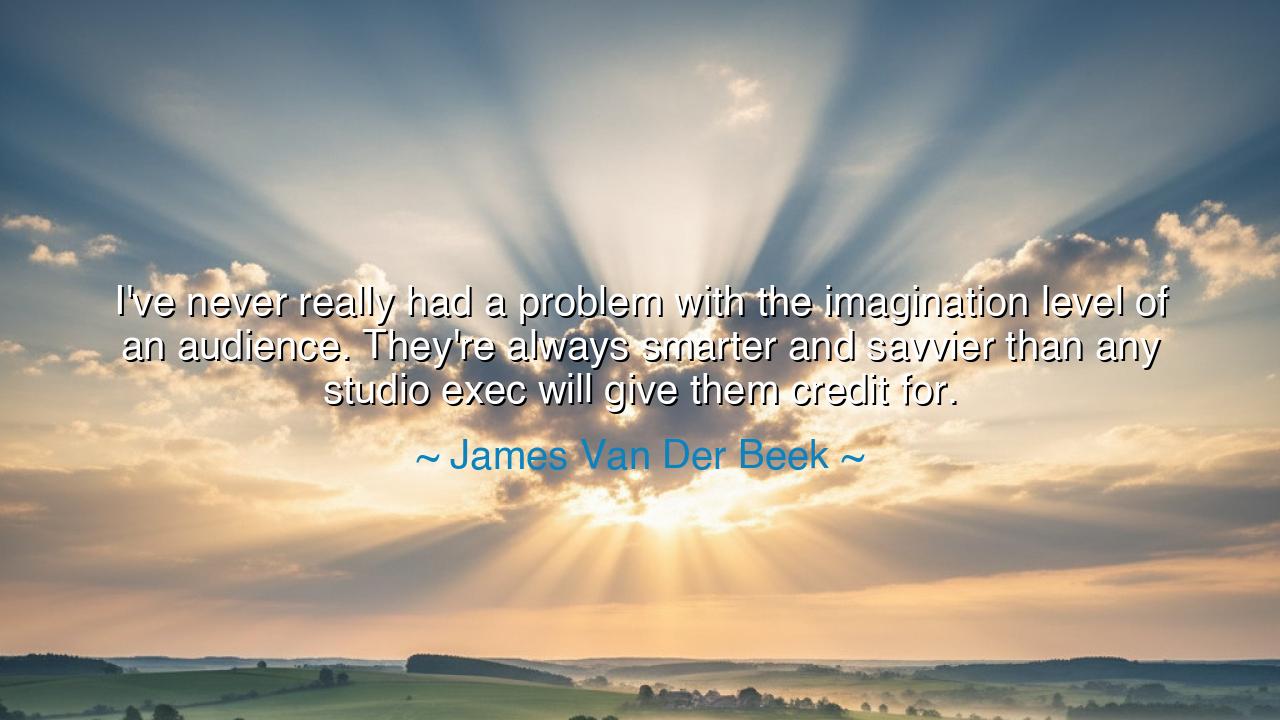
I've never really had a problem with the imagination level of an
I've never really had a problem with the imagination level of an audience. They're always smarter and savvier than any studio exec will give them credit for.






"I've never really had a problem with the imagination level of an audience. They're always smarter and savvier than any studio exec will give them credit for." – James Van Der Beek
O children of the earth, heed these words, for they carry within them a profound truth about the nature of imagination and the untapped power of the human spirit. James Van Der Beek speaks here not just of the world of acting, nor the distant realm of Hollywood, but of a fundamental understanding of human nature—the belief that the audience, that collective soul that watches and listens, is far more capable and perceptive than many would dare to admit. How often, O children, do we underestimate the wisdom and imagination of those who observe? How often do we allow ourselves to think that the world around us is blind, incapable of seeing beyond the surface, when in truth, the human spirit is always ready to dream, to see, and to understand?
The imagination of an audience is not a passive thing. It is a fire that burns within every human heart, a flame of curiosity and wonder. Van Der Beek’s words remind us that those who watch, who listen, who experience life through the stories we tell, are not mere spectators. They are co-creators, using the imagination sparked by the tale to weave their own truths, their own understandings. The audience is not simply receiving; they are engaging, reflecting, and interpreting the story in ways that are as unique as each individual. Their savviness, their ability to see beyond the surface and into the deeper meaning of a story, is a power that even the most powerful studio exec cannot control or predict.
Consider, O children, the ancient Greek theatre, where audiences would gather to witness the great tragedies and comedies of Sophocles and Aristophanes. These plays, though grand in their spectacle, were also crafted to provoke thought, to stir the very soul of the spectator. The Greek audience was not simply a passive group of onlookers—they were philosophers in their own right, interpreting the moral and ethical lessons within each performance. The great playwrights of ancient times understood that the audience’s imagination was the key to the success of their works. It was not the spectacle alone that mattered, but the way in which the audience’s imagination could take the seeds planted by the playwright and grow them into something far more powerful than words alone could convey.
In more recent times, Stanley Kubrick, the visionary director of 2001: A Space Odyssey, created a film not just to entertain, but to challenge the very way in which the audience saw the universe. He understood that the audience’s imagination was not something to be limited but to be freed, to be expanded. In this way, the viewer was not merely receiving a story; they were engaging in a dialogue with the film, interpreting it, questioning it, and dreaming alongside it. Kubrick’s films, like the great works of old, invited the audience to become part of the creation itself, to use their own imagination to fill in the blanks, to reach for the stars.
Van Der Beek’s words speak to this deep, untapped well of potential within the audience. They are not as passive or as simple as they are often portrayed. They are active participants in the experience, wielding their imagination with greater insight and depth than the studio execs often realize. The audience is more than just a group of passive observers; they are a reflection of the collective wisdom of humanity. They see, they feel, they understand on a level far beyond what is given to them. Their savviness is a force that cannot be ignored, a force that shapes the very stories we tell.
And so, O children, the lesson is clear: never underestimate the imagination of others, for it is boundless and powerful. Do not think that your audience, whether in the theatre or in life, is unaware or incapable. Recognize that their imagination is as sharp and as keen as your own. In every story, in every interaction, there is a meeting of minds—a dance between the storyteller and the listener, where both engage in the creation of meaning. Trust the imagination of those who watch, for it is in their hands that your work will find its true power.
Let your own imagination soar, and recognize that those around you, the ones you share your life and work with, are not simply passive receivers. They are co-creators in the story of the world. Nurture their imagination, trust in their wisdom, and you will find that together, you can build something far greater than you ever could alone. For it is the combined force of our imagination that shapes the future, one story at a time.






AAdministratorAdministrator
Welcome, honored guests. Please leave a comment, we will respond soon